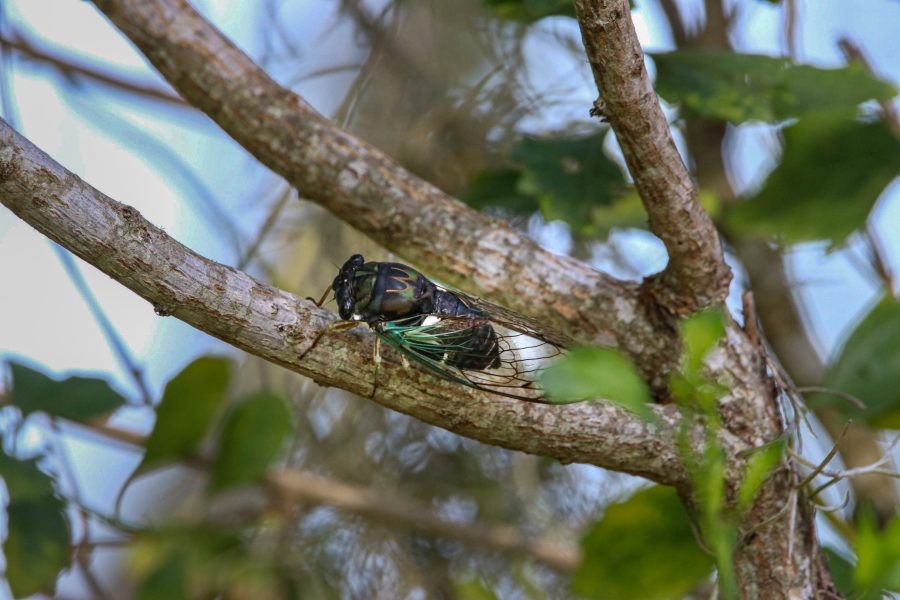The singing of cicadas is about to become a cacophony. Brood X cicadas are one of the largest broods of the 17-year periodical cicada, and billions are predicted to emerge in 15 states this spring, including several Ohio counties.
The buzz of these billions of cicadas will not affect those lucky enough to live in Wood County as the brood will not emerge here.
Chris Gajewicz, the natural resources coordinator for the Bowling Green Parks and Recreation Department, said BG does not experience Brood X or other periodical cicada broods because of the soil and tree sap.
He said periodical cicadas need dry and fairly well drained land to live. A swamp existed in BG until 1840. While the swamp has been drained, he said the swamp-like soil makes BG an unlivable place for the periodical cicada.
He also said the dominant tree in BG is the oak tree, which contains a very bitter substance called tannin. He said periodical cicadas do not want to feed on bitter tree sap for 17 years.
“We don’t tap oak trees to make maple syrup,” he joked.
While the periodical cicadas have 17 years to feast, various animals will feast on them once they emerge because they are so plentiful.
“It’s like a never ending buffet in Las Vegas, and it lasts for a couple weeks,” Gajewicz said.
Daniel Pavuk, BGSU professor who works with insect ecology, said there are advantages and disadvantages that come to an area that experiences the periodical cicada.
One advantage is the plentiful food source the cicadas will provide for animals. One disadvantage is the damage that they cause.
Pavuk said female periodical cicadas make a slit in tree branches to lay their eggs and this kills the branches. This damages trees and the fruit that grows on them, so people are advised to not plant new trees in the year of a periodical cicada emergence.
Because the periodical cicadas emerge in such large numbers, they are mainly an inconvenience.
“People don’t usually plan a wedding around a periodical cicada emergence,” he said. “But sometimes they get surprised by that. And not a good surprise.”
Hancock County, the county directly south of Wood County, is expected to experience this emergence.
Michelle Rumschlag, the naturalist for the Hancock Park District, views Brood X as something to be excited for.
“It’s just one of those kind of neat nature phenomenons,” she said. “It only happens every 17 years, and it doesn’t happen everywhere.”
She said cicadas do not sting or bite people, and she thinks this emergence has the possibility of bringing more people interested in nature into the parks.
“If there’s a big explosion in one of the parks, I mean we would probably promote that like, ‘Come on up,’” she said. “It’s already happening so what can we do to inform people about it or program it?”
Brood X is predicted to be one of the largest broods. According to a March 2021 article that appeared in WTOP News, some areas are expected to have as many as 1.5 million cicadas per acre. By the end of the emergence, naturalists expect there to be billions if not trillions of cicadas. This means the areas affected will become very messy once all the cicadas die off.
“Cities and communities are going to have to do something to remove the waste that is left over after they die,” Gajewicz said.
He added, “We don’t have to deal with that. I suppose it’s a good thing. I don’t have to clean my gutters out. I don’t have to power wash my house.”
Pavuk said periodical cicadas could adapt to the soil of Wood County overtime, but it is unlikely because of how localized periodical cicadas tend to be.
“It would take a long time for them to adapt to this area before they would actually become an issue,” he said.
According to a July 2020 article that appeared in BG Independent News, although Wood County residents do not experience the periodical cicada, they do experience the dog day cicada every year.
Pavuk said dog day cicadas do cause some damage to the trees in BG when they emerge. He said since there are not a lot of them, they get eaten up fast and therefore do not have a significant effect on BG when they come.
“It’s a fractional amount of what they will be experiencing with Brood X,” Gajewicz said. “It’s such a familiar summer sound here, but with these [annual dog day cicada] eruptions, that sound is deafening.”





















